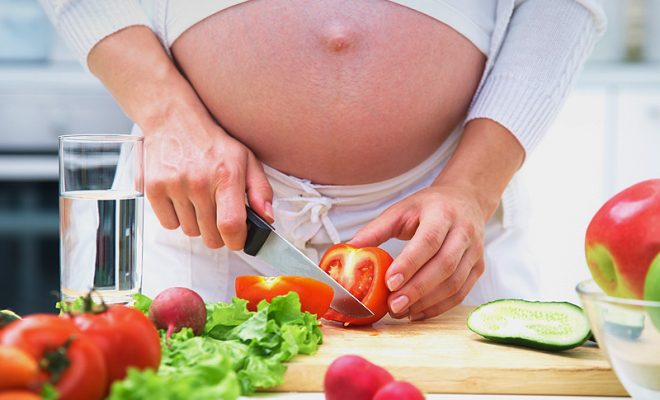Eating Right during Pregnancy: A Quick Overview of the Basics!

Pregnancy is an interesting phase, where your body undergoes many changes. You will also feel very different both emotionally and mentally. From those happy days to other low moments coupled with mood swings, things may not be the same with each passing day. However, there’s one thing that requires your constant attention – Your diet. Pregnancy nutrition is all about healthy eating for optimal baby development. In this post, we take a look at some of the basics.
Don’t skip anything
Your body needs everything – right from grains to fruits, veggies and dairy products. It is necessary that you eat right and in balance. You don’t have to skip a fruit just because it is high on calories. However, it is absolutely necessary that you steer clear of junk food at all times. Avoid anything that’s too high on either salt or sugar content.

Fiber is crucial
Wholesome cereals, beans and pasta are important sources of fiber, and you need to have some each day to avoid constipation. Most of the fruits and veggies contain considerable fiber too. In case your doctor finds it necessary, a fiber supplement may be recommended, but usually the dosage is reduced and increased only gradually.
Focus on complete nutrition
Having enough vitamins, minerals, and omega-3 fatty acids during pregnancy is more than necessary, to ensure optimal growth of your baby. If you can get all these things from dietary sources, nothing like it, but in most cases, women need prenatal vitamins. The idea is to keep up the nutrition quotient while keeping a tab on the calories.
Know the don’ts
Uncooked or raw meats and eggs must be avoided during pregnancy. You have to eat right and in balance, and for that, eggs and meats are good sources of protein. However, meats can contain foodborne bacteria, which is why cooking the meat thoroughly is always recommended. Avoid poached or scrambled eggs and have boiled eggs instead. Unpasteurized milk, dairy, and fruit juices must also be avoided during pregnancy. You can easily find pasteurized varieties in the market, which doesn’t have to cost a bomb.

It is always a good idea to talk to your doctor before considering any major changes in your diet. You don’t extra calories in the first trimester, and only 300 extra during the second and third trimesters. In short, do not overeat!






